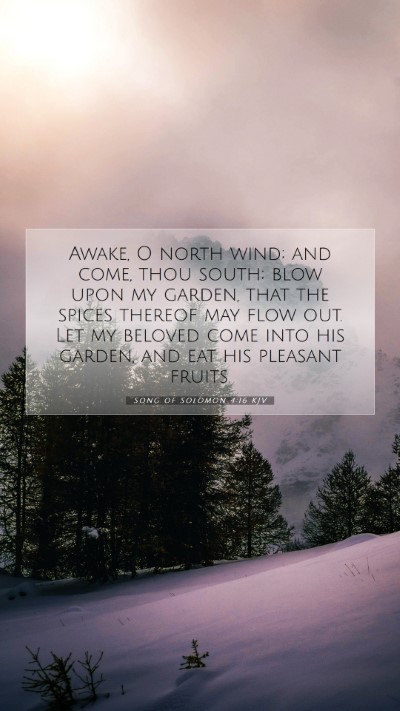Understanding Song of Solomon 4:16
The verse Song of Solomon 4:16 reads:
"Awake, O North Wind; and come, thou South; blow upon my garden, that the spices thereof may flow out. Let my beloved come into his garden, and eat his pleasant fruits."
This passage is rich in poetic imagery and offers a profound insight into love, desire, and intimacy. Below are some detailed interpretations and meanings drawn from various public domain commentaries.
Bible Verse Meanings
In this verse, the speaker metaphorically calls upon the winds to awaken her garden, which symbolizes her heart or her inner self, ripe for love and sweetness. The garden represents a place of beauty and abundance, indicative of the intimate relationship between the speaker and her beloved.
Verse Commentaries
-
Matthew Henry's Commentary:
Henry elaborates on the symbolism of the "garden" as representing the heart that is filled with love and delight. The "North Wind" and "South Wind" are seen as powerful forces that can enhance the beauty and fragrance of the garden. In essence, this verse suggests a yearning for divine influence to invigorate and enrich love.
-
Albert Barnes' Notes:
Barnes notes the importance of winds in the agricultural understanding of the time. They bring change, growth, and transformation. He also highlights the request for the beloved to come into the garden as an invitation for intimacy and closeness, indicating the depth of emotional and physical desire that exists between lovers.
-
Adam Clarke's Commentary:
Clarke emphasizes the call for the winds as an appeal for inspiration and awakening. He interprets the winds as allegorical forces that evoke the natural expressions of love. The significant request for the beloved to "eat" from the garden connotes a desire for fulfilling the relationship and enjoying its fruits.
Biblical Exegesis
This verse can be analyzed in the context of the overall theme of love found in the Song of Solomon, which celebrates romantic love through vibrant imagery. The winds are representative of both the joys and challenges of love, showing how external forces can impact one's inner life. The verse encapsulates a deep longing and the collaborative nature of romantic relationships, where both partners contribute to the growth of their bond.
Scripture Analysis
Understanding this scripture involves recognizing the allegorical nature of the language. The garden symbolizes not only a relationship’s potential but also the shared experiences that allow love to flourish. The phrases “blow upon my garden” and “eat his pleasant fruits” reflect both active involvement and mutual satisfaction within love.
Relationships and Cross References
This verse relates to several others, reinforcing themes of love and intimacy:
- Genesis 2:24: Discusses the union of husband and wife.
- Proverbs 5:15: Encourages the enjoyment of marital love.
- Ephesians 5:25-28: A call for husbands to love their wives as Christ loves the church.
Applications of the Verse
The essence of this verse can apply to daily life by encouraging individuals to nurture their relationships actively. Here are some suggestions:
- Engage in open communication to enhance emotional intimacy.
- Create shared experiences that symbolize growth within the relationship.
- Seek divine guidance in love, asking for the winds to inspire and enrich personal connections.
Bible Study Insights
This verse can serve as a focal point for Bible study groups focusing on understanding relationships through a biblical lens. It encourages discussions on:
- The significance of mutual desires in relationships.
- A biblical perspective on romance and intimacy.
Conclusion
Song of Solomon 4:16 invites reflection on the beauty of love, illustrating how intimacy can be cultivated through appreciation, communication, and divine influence. This verse, through its metaphorical language, serves to deepen one's Bible verse interpretations and enrich Bible verse understanding amongst those seeking meaningful connections in their lives.


